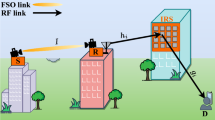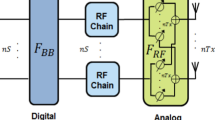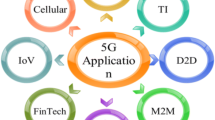Abstract
In this paper, we investigate the performance analysis of a scheduled transmit beamforming system under non-identically delayed feedback channels. This paper derives the exact closed-form expressions of the scheduling system for the symbol error rate (SER) with M-ary phase shift keying and quadrature amplitude modulation including the outage probability and ergodic capacity under the non-identical feedback delay channels. We also quantify the diversity order and signal to noise ratio (SNR) gain of the SER and outage probability which provide insights into which parameters affect the system performance. From analytical results, we show that the feedback delay in the scheduling system removes only the advantage of the spatial diversity not the advantage of multi-user diversity. Thus, the diversity order of the SER and outage probability for the scheduling system is proportional to the number of users under the non-identically delayed feedback channels. Further, the SNR gain of the SER and outage probability for the scheduling system is proportional to the sum of the feedback delay coefficient for all user terminals. Finally, the ergodic capacity of the proposed system is significantly improved as the number of users increases, while being relatively less affected by the sum of the feedback delay coefficients.












Similar content being viewed by others
References
Love, D. J., Heath, R. W., & Strohmer, T. (2003). Grassmannian beamforming for multiple-input multiple-output wireless systems. IEEE Transactions on Information Theory, 49(10), 2735–2747.
Winters, J. H. (1998). The diversity gain of transmit diversity in wireless systems with Rayeigh fading. IEEE Transactions on Vehicular Technology, 47(1), 119–123.
Huang, K., Andrews, J. G., & Heath, R. W. (2009). Performance of orthogonal beamforming for SDMA with limited feedback. IEEE Transactions on Vehicular Technology, 58(1), 152–164.
Lee, D. (2015). Performance analysis of scheduled STBC over non-identically distributed arbitrary Nakagami fading channels. IEEE Communications Letters, 19(7), 1269–1272.
Tsai, J. A., Buehrer, R. M., & Woerner, B. D. (2002). Performance of transmit beamforming in Ricean fading channels: Robustness on quantization error and feedback error. Proceedings of IEEE VTC-Fall, 3, 1792–1795.
Huang, K., Mondal, B., Heath, R. W., & Andrews, J. G. (2006). Effect of feedback delay on multi-antenna limited feedback for temporally correlated channels. In Proceedings of IEEE Globecom.
Isukapalli, Y., & Rao, B. D. (2007). Finite rate feedback for spatially and temporally correlated MISO channels in the presence of estimation errors and feedback delay. In Proceedings of IEEE Globecom.
Lee, D., & Jeong, B. J. (2014). Symbol error rate analysis of transmit beamforming systems under delayed and limited feedback. Electronics Letters, 50(4), 321–323.
Ma, Y., & Zhang, D. (2007). Error rate of transmit beamforming with delayed and limited feedback. In Proceedings of IEEE GlobeCom, (pp. 4071–4075).
Ma, Y., Zhang, D., Leith, A., & Wang, Z. (2009). Error performance of transmit beamforming with delayed and limited feedback. The IEEE Transactions on Wireless Communications, 8(3), 1164–1170.
Spencer, Q. H., Peel, C. B., Swindlehurst, A. L., & Haardt, M. (2004). An introductin to the multi-user MIMO downlink. IEEE Communications Magazine, 42(10), 60–67.
Gozali, R., Buehrer, R. M., & Woerner, B. D. (2003). The impact of multiuser diversity on space-time block coding. IEEE Communications Letters, 7(5), 213–215.
Jiang, C., Zhang, H., Han, Z., Ren, Y., Leung, V., & Hanzo, L. (2016). Information-sharing outage-probability analysis of vehicular networks. IEEE Transactions on Vehicular Technology, 65(12), 9479–9492.
Viswanath, P., Tse, D. N. C., & Laroia, R. (2002). Opportunistic beamforming using dumb antennas. IEEE Transactions on Information Theory, 48, 1277–1294.
Shao, X., Yuan, J., & Shao, Y. (2007). Error performance analysis of linear zero forcing and MMSE precoders for MIMO broadcast channels. IET Communications, 1(5), 1067–1074.
Balakrishman, N., & Cohen, A. (1991). Order statistics and inference, estimation methods. San Diego, CA: Academic.
Turkyilmazx, K. (2009). Order statistics in outlier models. M.S. Thesis.
Zhang, H., & Gulliver, T. A. (2005). Capacity and error probability analysis for orthogonal space-time block codes over fading channels. IEEE Wireless Communications, 4(2), 808–819.
Proakis, J. G. (2001). Digital communications (4th ed.). New York: McGraw- Hill.
Wang, Z., & Giannakis, G. B. (2003). A simple and general parameterization quantifying performance in fading channels. IEEE Transactions on Communications, 51(8), 1389–1398.
Simon, M. K., & Alouini, M.-S. (2005). Digital communication over fading channels (2nd ed.). New York: Wiley.
Gradshteyn, I. S., & Ryzhik, I. M. (2007). Table of integrals, series, and products (7th ed.). San Diego, CA: Academic.
Perez, J., Ibanez, J., Vielva, L., & Santanmaria, I. (2005). Closed-form approximation for the outage capacity of orthogonal STBC. IEEE Communications Letters, 9, 961–963.
Author information
Authors and Affiliations
Corresponding author
Rights and permissions
About this article
Cite this article
Lee, D. Performance analysis of scheduled transmit beamforming systems under non-identically delayed feedback channels. Wireless Netw 25, 653–664 (2019). https://doi.org/10.1007/s11276-017-1582-2
Published:
Issue Date:
DOI: https://doi.org/10.1007/s11276-017-1582-2




